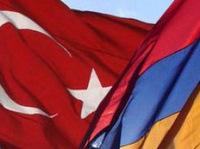
Azerbaijan Clarifies View of Baku-Ankara-Yerevan Normalization Process
Publication: Eurasia Daily Monitor Volume: 8 Issue: 53
By:

Interviewed by Turkish media after concluding a visit to Ankara (Hurriyet Daily News & Economic Review, March 14; CNN Turk, March 16), Azerbaijan’s Deputy Foreign Minister, Araz Azimov, has clarified his government’s view on normalizing Azerbaijan-Turkey-Armenia relations. Baku sees this as a two-track process that must go hand in hand with resolving the Armenia-Azerbaijan conflict. Azimov held talks with Turkish Foreign Minister, Ahmet Davutoglu, during this visit. The vision as such had been known in broad terms; but Azimov’s Ankara visit has added some specifics and firmed up Turkish support.
A many-faceted concept, normalization would include re-opening Azerbaijan’s and Turkey’s respective borders with Armenia as a centerpiece of the process. Turkey had closed its land border with Armenia in 1993 in solidarity with Azerbaijan, after Armenian forces had crossed the line from Armenian-populated Karabakh deeper inside Azerbaijan, conducting mass ethnic cleansing in the process. Meanwhile, economically stagnant Armenia cannot develop while its borders with Turkey and Azerbaijan remain closed. Azerbaijan and Turkey are prepared to re-open both borders, if Armenian troops withdraw from Azerbaijani districts adjacent to the Armenian-populated Karabakh. This logic is also in line with the stage-by-stage resolution process within the Organization for Security and Cooperation in Europe (OSCE) Minsk Group.
As spelled out in Azimov’s presentation, the first phase of the process would involve the Armenian troops’ withdrawal from the Agdam, Fuzuli, Jebrail, Zangilan, and Kubatli districts, all situated in Azerbaijan’s interior, abutting on three sides on the Armenian-populated Karabakh region. Withdrawal of troops and re-opening of borders would proceed gradually as parallel processes. This first phase would include the provision of security guarantees, post-conflict reconstruction in Azerbaijani territories vacated by Armenian forces, and the return of Azeri expellees to their homes there. Along with this, cross-border trade and transportation between Armenia, Azerbaijan, and Turkey would go ahead. Karabakh’s Armenian population could also resume economic and social contacts with its Azeri neighbors as part of post-conflict normalization.
This first phase is envisaged to be completed within five years. The second phase would involve withdrawal of Armenian forces from remaining areas of Azerbaijan, return of Azeri expellees there, international security guarantees for the Armenian population, and negotiations on Karabakh’s final status. Azerbaijan takes the position that the status would ultimately involve self-government and a bi-communal model, within the framework of Azerbaijan’s territorial integrity. As Baku recognizes, the status issue remains the ultimate stumbling block in the negotiations (www.news.az, March 16).
Azerbaijan and Turkey have broached this two-phased concept with the Minsk Group’s co-chairs in Washington, Moscow, and Paris. The aim is to promote an environment of normality and legality in Azerbaijan-Armenia and Turkey-Armenia relations concurrently. Such an environment is a prerequisite to negotiating the thorny issue of Karabakh’s status in the follow-up phase of the process. In the existing environment, however, characterized by territorial occupation and ethnic cleansing, any negotiations on status would lead nowhere; and could even provide a semblance of legitimacy to the present situation on the ground.
Armenia’s foreign ministry has quickly rejected the proposed concept in undiplomatic terms. The ministry’s spokesman also ruled out any Turkish input into the negotiating process, notwithstanding that Turkey is a member of the Minsk Group (Armenpress, Mediamax, March 14).
Yerevan holds to its own view of normalizing relations with Turkey. It wants Ankara to re-open the land border with Armenia unconditionally, de-coupled from the withdrawal of Armenian forces from Azerbaijan’s interior districts. Further, it wants Turkey to proceed unilaterally and isolate Azerbaijan, instead of acting in tandem with it.
Those were also the implications of the October 2009 Zurich Protocols, signed by Turkey and Armenia with a push from the Obama Administration. Domestic political considerations mainly inspired this push. The administration expected Yerevan and its US Armenian supporters to return the favor and relegate the Armenian genocide recognition issue, from the US political arena into a historians’ commission for debate. Some Turkish officials apparently also felt that the trade-off would relieve Turkey of pressure on that issue.
Under those documents, Ankara was to have re-opened the Turkish-Armenian border without any linkage to the Karabakh conflict-resolution process, and separately from Azerbaijan. The linkage-breaking would have removed the economic incentive for Armenia to withdraw its troops from Azerbaijan’s interior districts. The stage-by-stage resolution process would have been derailed, the chances of a peaceful settlement compromised, the Turkey-Azerbaijan strategic partnership torn apart, an isolated Azerbaijan pushed into Russia’s arms, and the Azerbaijan-Georgia tandem undermined. By discounting these implications, the Obama administration seriously hurt its relations with Azerbaijan, without winning over Armenia.
Those implications, topped by a domestic political backlash in Turkey, caused Prime Minister Recep Tayyip Erdogan to declare the protocols unacceptable in December 2009 in Washington, only two months after the Zurich signing event. This prevented the Obama Administration from using the protocols to appease US Armenian advocacy groups, in lieu of delivering the promised recognition of the 1915-1918 events in Ottoman Turkey as a genocide. State Department officials continued into mid-2010 advocating for the protocols’ ratification and implementation. This issue tends to recur annually in the run-up to Armenian Remembrance Day, April 24 in the US.
On March 3, 2011, US Assistant Secretary of State Philip Gordon told the Global Security Forum in Bratislava (GlobSec) that the US strongly supports “normalization” between Turkey and Armenia through the Zurich Protocols. Acknowledging that this process had stalled, Gordon urged its continuation “to further trust and peace and stability.” Recalling that Secretary of State Hillary Clinton had promoted and witnessed the Turkish-Armenian protocols’ signing, Gordon urged “the parties to move forward to peace and reconciliation.” The statement stressed Turkey-Armenia reconciliation without mentioning the Armenia-Azerbaijan conflict, US-Azerbaijan relations, or the wider implications of compartmentalizing these issues (US State Department transcript, released March 3).
Effective normalization and reconciliation cannot advance on just one track, Turkey-Armenia, de-coupled from the other track, Armenia-Azerbaijan, and outside the process of resolving the Karabakh conflict. These issues are closely interrelated. Turkey has understood this more clearly and reinstated the linkage policy. Turkey-Azerbaijan coordination is critical to advancing Armenia-Azerbaijan conflict-resolution negotiations.




